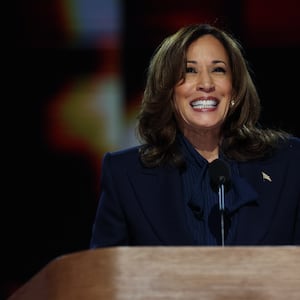They saved the best for last.
In a week of speechmaking like none of us have seen in our lifetimes, with one barn-burning or heart-tugging or inspiring address after another electrifying the crowd at the Democratic National Convention, the biggest question confronting Kamala Harris before she took the stage for the final keynote of the event was “How can she top all that?”
How do you top the fire of AOC? How do you top the resonance of Hillary Clinton? The eloquence of Pete Buttigieg? The loved-filled words of Doug Emhoff? The gut wrenching testimony of the women who had suffered due to Donald Trump’s assault on their fundamental rights and bodily autonomy? The compelling remarks of one Republican leader after another, from Olivia Troye to Adam Kinzinger, who said that this year they would be voting for Kamala not as Democrats but as patriots, to protect our democracy?
ADVERTISEMENT
The trip to church on which Reverend Raphael Warnock and then Democratic Minority Leader Hakeem Jeffries took the crowd? Oprah’s searing surprise address? The big names like Bill Clinton or Nancy Pelosi? The high wattage rising stars like Wes Moore and Gretchen Whitmer? The valedictory of Joe Biden? The completely expected but nonetheless surpassing mastery of Michelle and Barack Obama? The star-is-born-yet-again vibe of Tim Walz’s remarks elevated by the pictures of his loving family? The heartbreaking personal stories of gun violence victims?
Pick the analogy that suits your era. This week in Chicago was the Woodstock or the Live Aid or the Lollapalooza or the Coachella or Burning Man of political oratory, but fortunately for all in attendance it was better stage-managed and a lot more comfortable for the attendees than all of those.
Michelle Obama described it as “magic.” Everyone spoke of the joy that lifted everyone’s remarks even more effectively and consistently and higher than even the expertly crafted playlist that accompanied the ceremonial roll call vote on Tuesday night.
All of it rose to a crescendo that itself was capping off the most remarkable month of spontaneous nationwide momentum-building in U.S. political history. Which meant that for the Vice President of the United States the pressure was on. Could she be worthy of the week of praise? Could she live up to the expectations of the crowd or the audiences watching at home?
More importantly could she serve as the bridge between her inaugural tour of the country and the festivities of the DNC and the cold hard business of the homestretch of the campaign, a campaign that will result in an election day choice between her and a man who has already pledged to gut our democracy and as Harris has so often said continue his work of his stripping away our most basic freedoms?

Kamala Harris delivers her acceptance speech during the final night of the 2024 Democratic National Convention in Chicago on Thursday, August 22, 2024.
Bill Clark/CQ-Roll Call, Inc via Getty ImagesHarris had to top it and then she had to make the ultimate call to action. She had to somehow translate good feelings and record fund-raising and surging momentum into results, beginning with the early voting that will start in just three weeks or so, into the blocking and tackling of turning out the vote, combatting GOP efforts to suppress that turn out, and, you know, saving the country and the world from another four years of Trump.
What is remarkable and deeply consequential is that she did just that. Even if she did not reach the highest highs of the Obamas’ remarks or the emotional depths plumbed by a simple cutaway from Tim Walz to his son Gus, she delivered not only the speech of her life on Thursday night, she delivered one that in substance, tone, and historical significance surpassed all those that came before her during this week that would have had Daniel Webster sitting up and taking notes.
Harris’ speech turned out to be structured much as the New York Times had predicted. They wrote on Thursday that it would include three core goals. First, defining who she is. Second, framing the election as a contest between the past and the future. And finally, importantly, reclaiming the banner of “patriotism” for Democrats. But as for the speech itself, as is the case in all good oratory, from the moment she walked on stage at just after 10:30 p.m. on Thursday night, it was clear that its effectiveness really lay not in its broad strokes but in its details and delivery, in the moments that best connected Harris, her convictions, and her audience.
It was a virtuoso performance that unfolded as what you might have expected from the kind of big star performer who was rumored to join the stage Thursday night but in the end, did not appear. It began in close up, intimately, with warmth and humanity. Then it steadily built, each section topping the one before it. From the personal recollections of her own origin story she built to not just telling about her time as a prosecutor and attorney general but revealing the steely resolve that distinguished her in those careers.
From there, in describing the threat posed by her opponent and by bad actors around the world and her commitment to America’s strength, she grew stronger and stronger, almost transforming herself in the course of 40-plus minutes from the girl who grew up in Oakland to the woman who should be, who must be, America’s next commander in chief.
She was a very different kind of communicator than the others who starred as her warm-up acts during this convention. Her style was confident, grounded in values, built on empathy. It was not the Horatio Alger blue-collar tale of Biden nor was it the rousing, nearly-poetic rhetoric of Obama. It was much more human-scale. But it also left no doubt that she was ready to assume the role of being the most powerful person in the world. (That said, one striking fact about the speech is that at no point did she turn to the “glass ceiling” framing of Hillary Clinton.

Kamala Harris, right, and her husband Doug Emhoff.
Brendan McDermid/ReutersShe who has been a first in every job to which she has been elected—the first woman, the first woman of color, the first Asian woman—never mentioned the historical precedents she would be setting. She knew that we knew. It was a sign of the kind of confidence that suffused the speech.
Her rhetoric captured both the best of being a storyteller telling a tale about people and the role of being a leader calling a nation to rise up and act at a moment of great historical importance.
Her parents’ words to her were a refrain at the outset: “Run Kamala, run. Don’t be afraid. Don’t let anything stop you.” “Never complain about injustice. Do something about it.” “Never do anything half-assed.”
Then she laid out principles, the laws that personally guided this committed prosecutor. “A harm against any one of us is a harm against all of us.” Her commitment to “hold sacred America’s fundamental principles… from the rule of law… to the peaceful transfer of power.” “The future is always worth fighting for.”
She set the historical stakes: “This election… is one of the most important in the life of our nation.” She described Trump’s crimes like a prosecutor laying out an indictment, detailing in many of them his “explicit intent” to do harm. Her description of Trump’s intentions to strip women of more of their fundamental rights, to appoint a board to monitor state by state miscarriages and abortions, was concluded with an emphatic and unforgettable: “Simply put, they are out of their minds.”
Listening, one could not help be struck by the very real possibility that after dodging prosecutors for many of his crimes for much of his life or playing the game of running out the clock against Merrick Garland’s Department of Justice, Trump had finally met the prosecutor who would bring him down, who would signal that now his time was up.
She skillfully made the case that Trump was wholly unfit to serve as president, to be our commander-in-chief. And then she made it crystal-clear that she was ready for both roles by describing the role she had played on the most important domestic and foreign policy issues of our time. Indeed, so forceful, specific and compelling was the case she made on national security issues—building on presentations earlier in the night by former Secretary of Defense Leon Panetta, Sen. Mark Kelly, and Rep. Adam Kinzinger—that perhaps national security and foreign policy were the surprise guests for the evening.
And then, as all greatstory tellers do, she brought us back home, back to the beginning of the story, back to her mother and the values with which she was imbued as a child:
Our opponents in this race are out there, every day, denigrating America. Talking about how terrible everything is. Well, my mother had another lesson she used to teach. Never let anyone tell you who you are. You show them who you are.
America, let us show each other—and the world—who we are. And what we stand for. Freedom. Opportunity. Compassion. Dignity. Fairness. And endless possibilities.
We are the heirs to the greatest democracy in the history of the world. And on behalf of our children and grandchildren, and all those who sacrificed so dearly for our freedom and liberty, we must be worthy of this moment. It is now our turn to do what generations before us have done. Guided by optimism and faith, to fight for this country we love.
To fight for the ideals we cherish.
And to uphold the awesome responsibility that comes with the greatest privilege on Earth. The privilege and pride of being an American.
So, let’s get out there and let’s fight for it.
Let’s get out there and let’s vote for it.
And together, let us write the next great chapter in the most extraordinary story ever told.
She took us from the intimate to the soaring, from facts we needed to the call to action the moment demanded. And in so doing, she provided the best and only possible ending for an extraordinary convention, its greatest speech, and more than that the impetus to begin the hard but essential work of actually winning the election.







